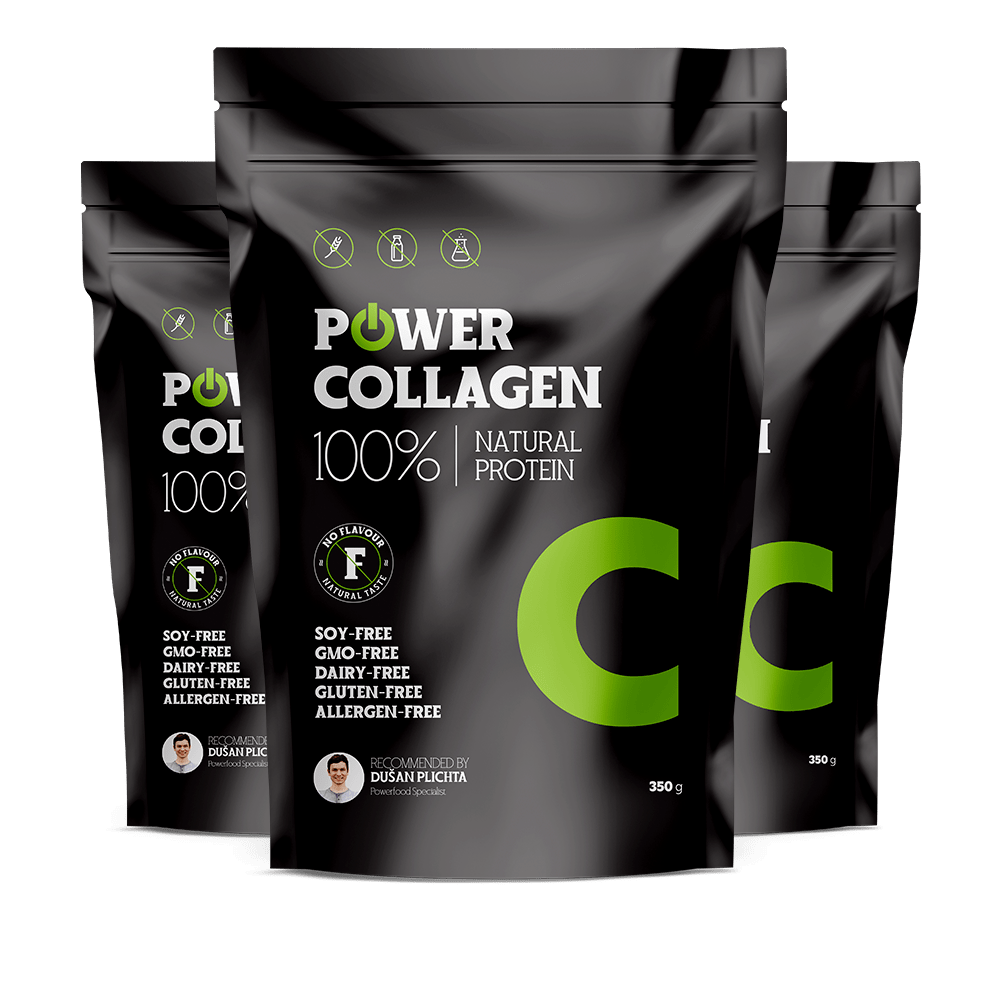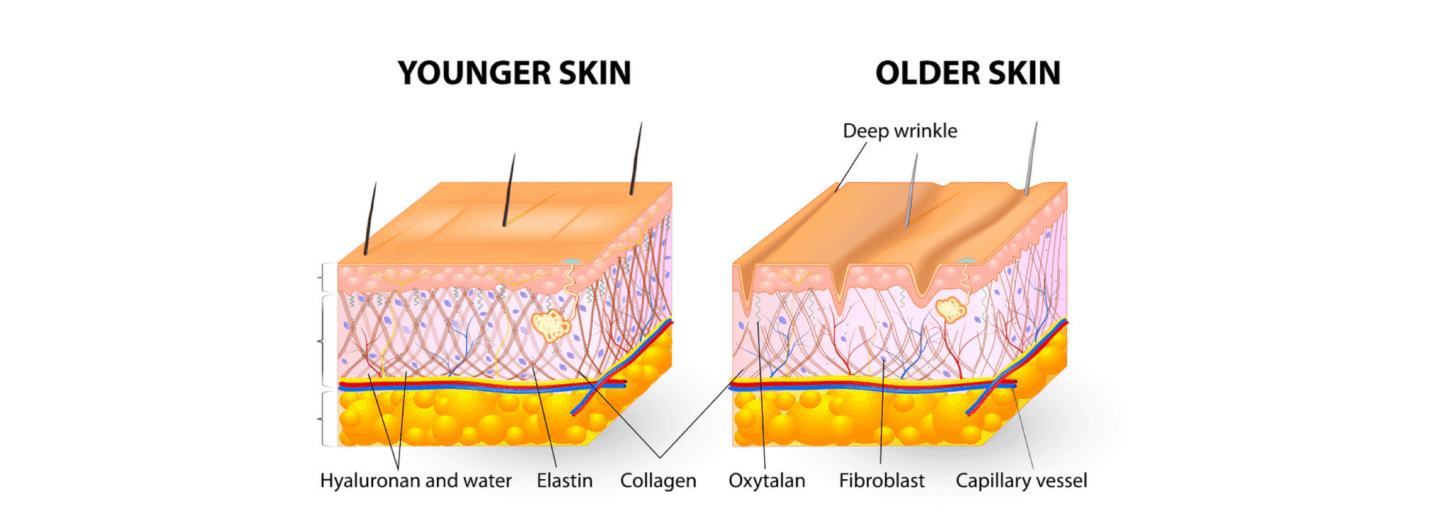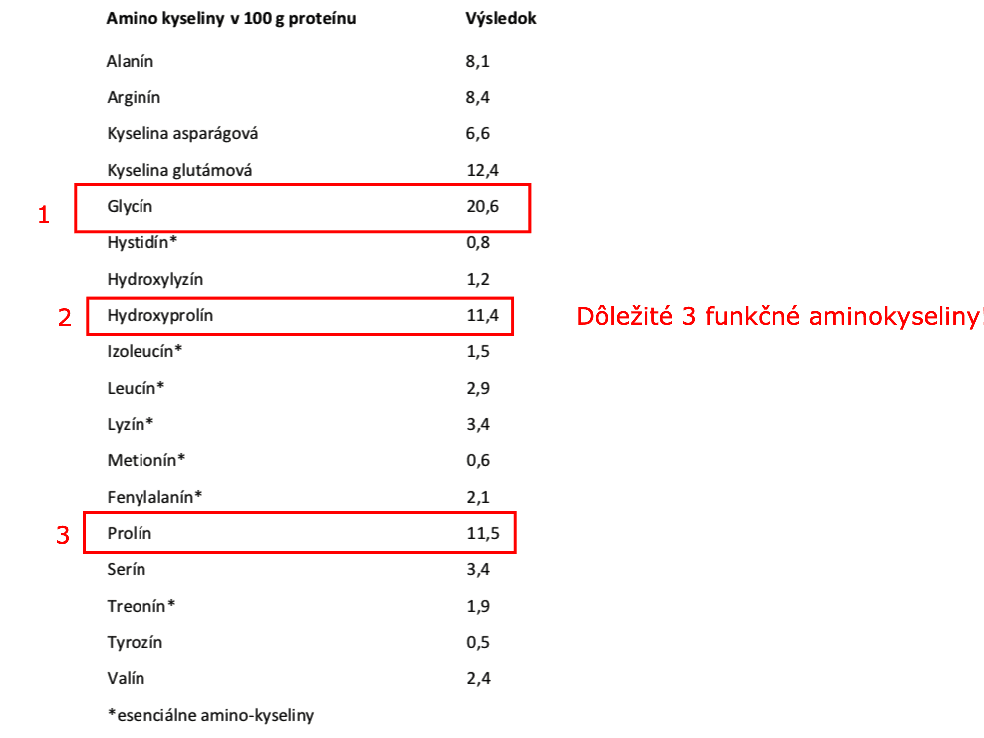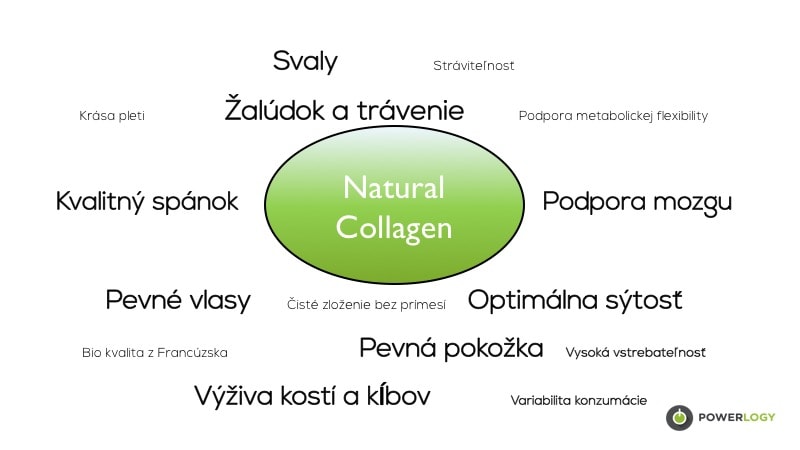How to consume collagen? Can it be a substitute for other proteins?
Collagen could also be called the protein of youth. Collagen is the basic building block of tissues, which represents up to 30% of all proteins in the body and up to 70% of skin proteins. Get inspired by our tips for food and supplements. Get to know its nutritional value. Collagen is a protein that is far from just for athletes, but for everyone and even for pregnant women, children or pensioners.
Basic definition and meaning
Collagen is the most abundant building protein of our body with a ratio of up to about 33%. It is basically a connective tissue for almost all structures in the body. From the hair, through the muscles, to the bones, or even the main organs, such as the heart, liver or lungs. Collagen is composed of a complete profile of important amino acids, especially the functionality of high doses of glycine, proline and hydroxyproline. It is these amino acids that most support the healing and regenerative processes in the body.
Although our body produces collagen naturally, with increasing age and average lifestyle, its production gradually decreases. This leads to a weakening of cell structures and signs of aging. The main difference between collagen and classical proteins such as whey, casein or vegan alternatives is the value of selected amino acids.
This does not mean that other proteins are bad, but rather that they are intended more for an anabolic effect and to support the growth or maintenance of muscle mass. Collagen, as you will read below in it’s 7 key benefits, is intended rather than long-term nutrition of cell tissues.
 7 benefits of consuming enough collagen
7 benefits of consuming enough collagen
- Bone and joint nutrition: collagen supports denser, heavier and stronger bones. It contains 2 types of cartilage, which must be replenished after each exercise or sports performance.
- Tissue regeneration: Collagen protein provides the body with amino acids that provide cohesiveness, elasticity and direct nutrition to the fascia.
- Skin and hair revitalization: collagen supports hydration thanks to the content of proline and glycine, prevents deepening of wrinkles, maintains the elasticity of your skin and firm hair.
- Deeper sleep: collagen protein used before sleep deepens sleep, supplies arginine to stimulate the release of growth hormone and the nutrients necessary to repair tissues during sleep.
- It supports the brain: the power collagen protein delivers glycine, a neurotransmitter involved in motor and sensory pathways as well as ATP synthesis.
- Slowing down aging: power collagen protein replaces essential proteins that weaken and break down with age, while contributing to the regeneration and maintenance of muscle mass, facilitating the synthesis of creatine in the body.
- Promoting the healing of the lining of the stomach and permeable bowel syndrome. The stomach, digestion and irritated bowel are often the biggest problems today.
Frequently Asked Questions about Power Collagen
Collagen, its meaning, use and various details could be written for several days. However, practice is more important, so we directly answer your most frequently asked questions about optimal use, storage and the like.
What is the origin, where it is made and does it have a lot of calories?
You can most often find pork, beef or fish collagen. Personally, I think fish collagen stinks a bit and I evaluated beef as the best in terms of value. However, the origin is important. The cows must graze on pastures and should not be injected with hormones, as well as production where the most modern technologies of hydraulics and processing are used. That’s why we chose a supplier from France that meets these standards and the amino acid content is excellent. Collagen contains calories only from proteins and you really don’t have to worry about gaining unwanted weight from 1-2 doses per day.
Can I consume collagen if I am pregnant?
Yes collagen is like eating beef broth and our collagen does not contain any ingredients. It is a pure hydrolysed bovine protein that is classified as a nutritional supplement. The optimal dose is recommended from 8-10g per day.
Is it necessary for collagen to contain Vitamin C and why does your product not contain vitamin C?
From our knowledge, it is good if a person also takes vitamin C with collagen. However, it has not been proven that the body does not absorb collagen without vitamin C, and it works so that, for example, if you have vitamin C in your body when you have a spoonful of collagen in the afternoon, the body absorbs it nicely. At the same time, in the case of natural collagen as part of product development, we were primarily concerned with the purity and quality of collagen, and most of the solutions offered with fortified vitamin C were of poorer quality and with a much worse amino acid profile.
For whom is collagen intended? Is it only for active athletes?
Collagen is intended for everyone who is interested in having a complex and complete nutritious diet, as it is the most abundant protein in the body, which is the basis for the renewal of cartilage, joints, tendons and tissue regeneration. Even for pregnant women, children and pensioners. Of course, the demands of the elderly, people in tissue regeneration after surgery, and athletes are greater.
How much do you need to take a day to make it work?
The needs are individual, as we cannot know exactly what condition your body and lifestyle are in. In any case, the scientific literature recommends an optimal dose of 8-10 g per day, which can be statistically applied to most people looking to support tissue nutrition.
If I prefer vegetarianism or veganism, then this collagen is not for me. What are my options?
Yes, we respect people with the decision to eliminate animal products, but in collagen it is a problem. We have not yet found a complete and high-quality supplement that meets the amino acid profile and quality standards. Collagen intake is the biggest challenge with a balanced and well-tuned vegetarian diet. It is not impossible, but it requires knowledge and specific combinations and resources of algae and the like.
Does Power Collagen contain artificial sweeteners, sugars, or in other words meets KETO and Low Carb dieting standards?
Here we have good news and as you can see from the composition, collagen is a pure protein without additives, sweeteners and flavorings. It also contains 0% gluten, lactose and sugar, so it fits perfectly into Keto and Low Carb.
How do I best protect or even strengthen my natural collagen production in my lifestyle?
But as with other thieves of health and energy, this is mainly about eliminating insomnia, smoking, starch and sugar content in nutrition. Then the individual elimination of inflammatory foods, high stress, excessive sunbathing, free radical intake, and lack of vitamin C and polyphenols in the diet.

Scientific research references on the effects of collagen peptide supplementation:
- https://www.ncbi.nlm.nih.gov/pubmed/24401291
- http://www.ncbi.nlm.nih.gov/pubmed/23949208
- https://www.ncbi.nlm.nih.gov/pubmed/24131075
- https://www.ncbi.nlm.nih.gov/pubmed/25989472
- https://www.ncbi.nlm.nih.gov/pubmed/28786550
- https://www.ncbi.nlm.nih.gov/pubmed/17076983
- https://www.ncbi.nlm.nih.gov/pubmed/11071580
- https://www.ncbi.nlm.nih.gov/pmc/articles/PMC2764342
- https://www.ncbi.nlm.nih.gov/pmc/articles/PMC4594048
- http://www.ncbi.nlm.nih.gov/pubmed/14600124
- https://www.ncbi.nlm.nih.gov/pubmed/7065145








Comments
There are no comments yet.